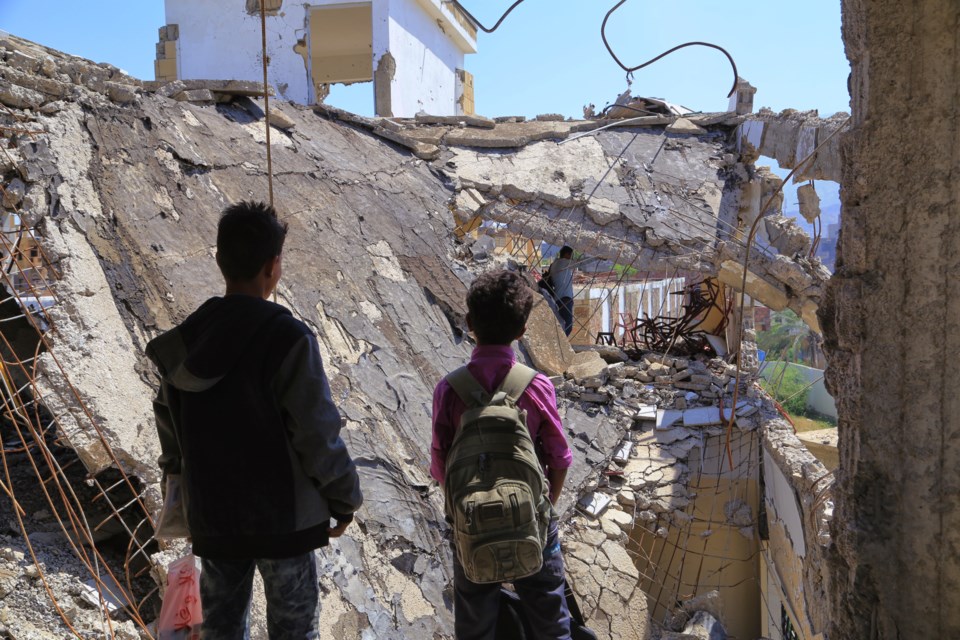My mind is racing over the famine in Yemen. How is this happening in present day? Why are so few of us even acknowledging it?
We live in a bubble of freedom and good fortune, where our news cycles are cluttered with tweets about nothing-burgers. Meanwhile, just shy of 20 million people are at risk of starvation. Tens of thousands have already perished.
Meanwhile, my to-do list includes stocking up at Costco.
We are so far removed from the dangers of this world, let’s take stock of what we miss while we ponder our next luxury, or simple trip to the grocery store.
No holier than thou shots here, I’m as guilty as anyone. Just last week I went without water for two days; a pipe burst. What a “pain.”
It struck me how much I take safe, fresh, running water for granted — and that Canadians can just call for help, and it arrives.
We need to hear the call of the Yemenis.
Imagine suddenly empty shelves at the once-full grocery store. Food prices skyrocketing to double or triple typical cost, for whatever you could find. Your home levelled in a flash of airstrikes. Water, if you could find it, might give you cholera.
The world’s most powerful democracies do little more than shrug. Politicians, people, seem to stand by like spectators as you and your family slowly starve.
That’s what it’s like for Yemenis in 2018. Today. Now.
The articles pop up on our news feeds featuring horrific photos of malnourished, starving, children. As many as 85,000 kids have starved to death in the last four years. That’s happening on our watch.
I see the articles, sit stunned by the photos of tragedy, and yet what do I (we) really know about what’s caused Yemen to spiral into this?
Not enough.
Our noisy news completely obscures this complex story.
Yemen is one of the Arab world’s poorest countries. In 2011, an Arab Spring uprising forced longtime authoritarian president Ali Abdullah Saleh to hand over power to his deputy, Abdrabbuh Mansour Hadi.
That didn’t go well, to say the least.
President Hadi struggled to deal with many issues, including al-Qaeda attacks, a separatist movement in the south, waning loyalty in the military, corruption, unemployment, and food insecurity. The Houthi movement took advantage, seized control of Saada province in the north. In 2015, Hadi’s government began to battle the Houthi militia — the Yemeni Civil War was underway.
The two sides began shooting (and bombing) with citizens literally caught in the crossfire. Many ordinary Yemenis supported the Houthis and in March 2015, Mr. Hadi fled the country.
In more powerful Middle Eastern countries with deep interests in Yemen’s ports, the alarm sounded. Iran, Saudi Arabia, and eight other Arab states began airstrikes aimed at “restoring” Hadi. The coalition received logistical and intelligence support from the US, UK and France.
To make things even more complex, the Saudi-led coalition saw divisions in their own ranks. The Saudis backed Mr Hadi; the United Arab Emerates aligned with the separatists.
At this point it should be noted: when you hear of Saudi “arms deals” — those weapons are being used against real people in Yemen.
Jihadist militants, including al-Qaeda and ISIS saw opportunity to capitalize on the chaos by seizing territory in the south, carrying out attacks and controlling key ports. More civilian casualties.
It’s a truly horrific situation that shows no sign of cooling. The United Nations says upwards of 5,000 people per day are contracting cholera, adding to the estimated already 500,000 dying of it.
The UN predicts that 14 million people are at risk of this “famine of biblical proportion”.
14 million people slowly starving to death. Think about that. The equivalent of almost half of Canada are at a very real risk of being wiped out.
As a nation, we’re allowing it by continuing to do business with them.
Some countries (neither Canada nor the US) have reacted in a meaningful way to the murder of Saudi-born Washington Post Journalist Jamal Khashoggi by putting a halt to arms sales with Saudi Arabia. Germany and Denmark took a stand, as did Finland, specifically stating they are doing so “in protest of the crisis in Yemen.”
Organizations like the Red Cross, Save the Children and others are frantically trying to get supplies to citizens. The issue is access. The blockades make it next to impossible to get supplies through. With the main port blocked, humanitarian organizations are forced to take the long way around, by way of the southern port of Aden. Armed checkpoints criss-cross the country. There are attacks on food processing and distribution.
This is going to get far worse before there is even a glimmer of hope for millions of people. It’s astounding that a crisis of this magnitude is unfolding right under our noses – and yet doesn’t seem to warrant much coverage.
There is urgent need for global citizens to inform ourselves about what happens half a world away. The time has past to stay complacent in this ever-growing humanitarian crisis.
It’s time to get loud and let our government know we want them to stand up for those who cannot.
We need to be better.
Jody Vance is a born and raised Vancouverite who has spent 30 years in both local and national media. The first woman in the history of Canadian TV to host her own sports show in primetime, since 2011 she’s been working in both TV and radio covering news and current affairs.



